I’ve read a lot of advice on writing, much of it long, drawn out, and not very helpful. Here’s some I like:
Artist’s problem: To get to the best in oneself. And then get away from it.
I’ve read a lot of advice on writing, much of it long, drawn out, and not very helpful. Here’s some I like:
Artist’s problem: To get to the best in oneself. And then get away from it.
I want to post some photos of my garden, and thought about what poem to go with it. Theodore Roethke was the great poet of gardens, his father ran a nursery. This one came to mind, earthy, slightly menacing.
Nothing would sleep in that cellar, dank as a ditch,
Bulbs broke out of boxes hunting for chinks in the dark,
Shoots dangled and drooped,
Lolling obscenely from mildewed crates,
Hung down long yellow evil necks, like tropical snakes.
And what a congress of stinks!— Roots ripe as old bait,
Pulpy stems, rank, silo-rich,
Leaf-mold, manure, lime, piled against slippery planks.
Nothing would give up life:
Even the dirt kept breathing a small breath.
Theodore Roethke
And here are the photos, not menacing at all.
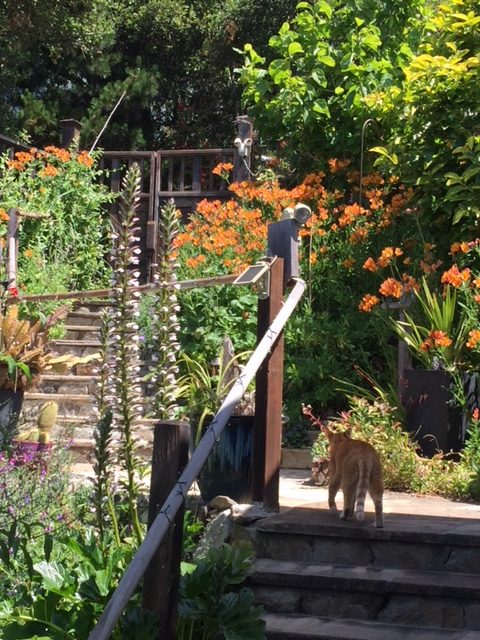
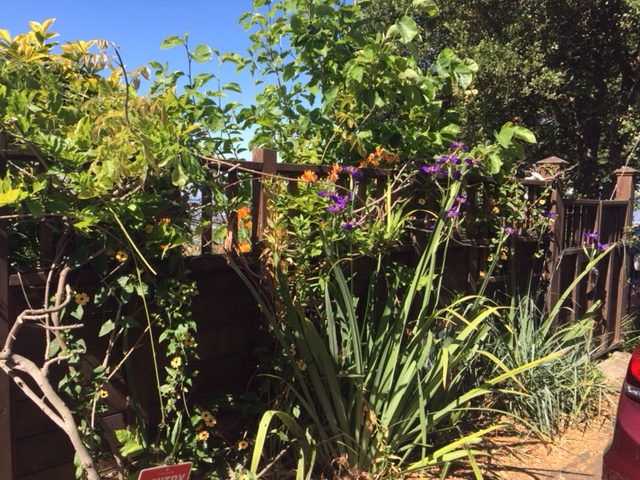
 If you’ve never read Theodore Roethke, you have a treat in store. He has written some of the lushest poems about gardens, dirt, and decay that you’d ever want to read, a lovely villanelle and many profound, longer poems. Today I’m posting the last two sections from “Mediations of an Old Woman,” one of the long poems. But “My Papa’s Waltz,” “The Waking” (villanelle), “Root Cellar, and “Big Wind”are among my favorites.
If you’ve never read Theodore Roethke, you have a treat in store. He has written some of the lushest poems about gardens, dirt, and decay that you’d ever want to read, a lovely villanelle and many profound, longer poems. Today I’m posting the last two sections from “Mediations of an Old Woman,” one of the long poems. But “My Papa’s Waltz,” “The Waking” (villanelle), “Root Cellar, and “Big Wind”are among my favorites.
3
As when silt drifts and sifts down through muddy pond-water,
Settling in small beads around weed and sunken branches,
And one crab, tentative, hunches himself before moving along the bottom,
Grotesque, awkward, his extended eyes looking at nothing in particular,
Only a few bubbles loosening from the ill-matched tentacles,
The tail and smaller legs slipping and sliding slowly backward—
So the spirit tries for another life,
Another way and place in which to continue;
Or a salmon tired, moving up a shallow stream,
Nudges into a back-eddy, a sandy inlet,
Bumping against sticks and bottom-stones, then swinging
Around, back into the tiny maincurrent, the rush of brownish-white water,
So, I suppose, the spirit journeys.
4
I have gone into the waste lonely places
Behind the eye; the lost acres at the edge of smoky cities.
What’s beyond never crumbles like an embankment,
Explodes like a rose, or thrusts wings over the Caribbean.
There are no pursuing forms, faces on walls:
Only the motes of dust in the immaculate hallways,
The darkness of falling hair, the warning from lint and spiders,
The vines graying to a fine powder.
There is no riven tree, or lamb dropped by an eagle.
There are still times, morning and evening:
The cerulean, high in the elm,
Thin and insistent as a cicada,
And the far phoebe, singing,
The long plaintive notes floating down,
Drifting through leaves, oak and maple,
Or the whippoorwill, along the smoky ridges,
A single bird calling and calling:
A fume reminds me, drifting across wet gravel;
A cold wind comes over stones;
A flame, intense, visible,
Plays over the dry pods,
Runs fitfully along the stubble,
Moves over the field,
Without burning.
xxxxIn such times, lacking a god,
xxxxI am still happy.
Theodore Roethke
After my trip to New England last month, where gardens are pretty much over for the year, I doubly appreciate being able to start a garden for fall and winter. I took all the dead tomato stalks, pea vines, and other debris, and turned them into mulch with the Eco-shredder, then planted seedlings and nestled them in: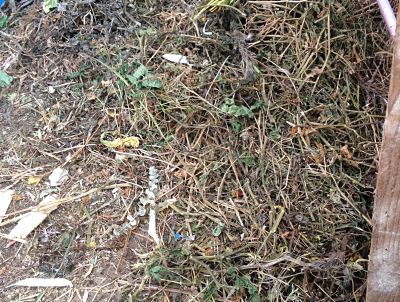
The raw debris
The mulched seedlings and garden.
Theres lots more, of course–seedlings waiting for planting, herbs flowers and spinach in the labyrinth, wildflowers sprouting up unasked for. What’s such a contrast to the winter I grew up in is that this is really the start of the been season here. I love it!
And here’s a Monday poem, by that garden master, Theodore Roethke, with his own thoughts about debris and the life force:
Nothing would sleep in that cellar, dank as a ditch,
Bulbs broke out of boxes hunting for chinks in the dark,
Shoots dangled and drooped,
Lolling obscenely from mildewed crates,
Hung down long yellow evil necks, like tropical snakes.
And what a congress of stinks!–
Roots ripe as old bait,
Pulpy stems, rank, silo-rich,
Leaf-mold, manure, lime, piled against slippery planks.
Nothing would give up life:
Even the dirt kept breathing a small breath.
Theodore Roethke
Does this line from Roethke’s “Lost Son” make you want to spend some time with his work? Here’s your chance. As a teenager I was thoroughly seduced by Theodore Roethke’s work, and still love it. As Galway Kinnell put it: “I suppose what I like most in Roethke is particularly that interest he had in real things including slimy things that everybody thought were too base a subject for poetry. There aren’t any angels in Roethke’s poems, but there are slugs and worms, and I like that about him.”
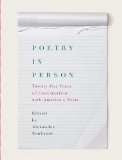 I came back to Roethke to this morning, remembering my great love of Roethke’s work by way of reading Poetry in Person, a series of interviews from a class run by Pearl London at the New School in New York, starting in 1970 and running for almost 25 years. The roster of interviewees is stellar, and the class became famous. Im jealous that I don’t have a similar resource in my life. There’s a short introduction to this book on youtube and a longer video of the celebration of its publication with anecdotes and readings by Maxine Kumin (someone else who writes about real things!), Paul Muldoon, Robert Pinsky, Ed Hirsch and others.
I came back to Roethke to this morning, remembering my great love of Roethke’s work by way of reading Poetry in Person, a series of interviews from a class run by Pearl London at the New School in New York, starting in 1970 and running for almost 25 years. The roster of interviewees is stellar, and the class became famous. Im jealous that I don’t have a similar resource in my life. There’s a short introduction to this book on youtube and a longer video of the celebration of its publication with anecdotes and readings by Maxine Kumin (someone else who writes about real things!), Paul Muldoon, Robert Pinsky, Ed Hirsch and others.
Roethke was not among those interviewed for the class, but the snippet from the Kinnell interview led me to take down my Collected Poems of Theodore Roethke and read through the opening sequence of Lost Son and Other Poems. Roethke deserves a better edition than this badly printed book! There is a Selected Poems, which despite the hideous portrait on the front seems like a book worth owning. Here are three poems by Roethke, and an elegy for Roethke by John Berryman. Roethke’s father owned a nursery and greenhouse, hence all the gardening images.
Orchids
They lean over the path,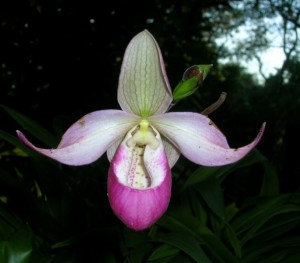
Adder-mouthed,
Swaying close to the face,
Coming out, soft and deceptive,
Limp and damp, delicate as a young
bird’s tongue;
Their fluttery fledgling lips
Move slowly,
Drawing in the warm air.
And at night,
The faint moon falling through whitewashed
glass,
The heat going down
So their musky smell comes even stronger,
Drifting down from their mossy cradles:
So many devouring infants!
Soft luminescent fingers,
Lips neither dead nor alive,
Loose ghostly mouths
Breathing.
Wish for a Young Wife
My lizard, my lively writher,
May your limbs never wither
May the eyes in your face
Survive the green ice
Of envy’s green gaze;
May you live out your life
Without hate, without grief,
And your hair ever blaze
In the sun, in the sun,
When I am undone,
When I am no one.
Big Wind
Where were the greenhouses going,
Lunging into the lashing
Wind driving water
So far down the river
All the faucets stopped?—
So we drained the manure-machine
For the steam plant,
Pumping the stale mixture
Into the rusty boilers,
Watching the pressure gauge
Waver over to red,
As the seams hissed
And the live steam
Drove to the far
End of the rose-house,
Where the worst wind was,
Creaking the cypress window-frames,
Cracking so much thin glass
We stayed all night,
Stuffing the holes with burlap;
But she rode it out,
That old rose-house,
She hove into the teeth of it,
The core and pith of that ugly storm,
Ploughing with her stiff prow,
Bucking into the wind-waves
That broke over the whole of her,
Flailing her sides with spray,
Flinging long strings of wet across the roof-top,
Finally veering, wearing themselves out, merely
Whistling thinly under the wind-vents;
She sailed until the calm morning,
Carrying her full cargo of roses.
A Strut for Roethke
Westward, hit a low note, for a roarer lost
across the Sound but north from Bremerton,
hit a way down note.
And never cadenza again of flowers, or cost.
Him who could really do that cleared his throat
& staggered on.
The bluebells, pool-shallows, saluted his over-needs,
while the clouds growled heh-heh, & snapped, & crashed.
No stunt he’ll ever unflinch once more will fail
(O lucky fellow, eh Bones?)—drifted off upstairs,
downstairs, somewheres.
No more daily, trying to hit the head on the nail:
thirstless: without a think in his head:
back from wherever, with it said.
Hit a high long note for a lover found
needing a lower into friendlier ground
to bug among worms no more
around um jungles where ah blurt ‘What for?’
Weeds, too, he favored as most men don’t favor men.
The Garden Master’s gone.
John Berryman
“The Waking” (a villanelle), “My Pappa’s Waltz,” “In a Dark Time,” are some of Roethke’s most famous poems, easy to find online. You can hear Roethke read “Big Wind” if you like. Stanley Kunitz wrote a wonderful tribute to Roethke that gives a sense of the man and his work.